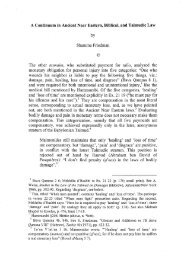Wimpfheimer_ Is it not so.pdf
Wimpfheimer_ Is it not so.pdf
Wimpfheimer_ Is it not so.pdf
Create successful ePaper yourself
Turn your PDF publications into a flip-book with our unique Google optimized e-Paper software.
Toward a Poetics of Legal Narrative in the Talmud ❙ 55<br />
surprising. The scholars in attendance translate his new category of employee,<br />
conceptually formed, into proximate real<strong>it</strong>y by suggesting that Rava, their teacher, is<br />
in this category. In this move, the students <strong>not</strong>e that their subject matterÐthe<br />
hiring of this new category of employeesÐreplicates <strong>it</strong>self w<strong>it</strong>hin their relationship<br />
to their teacher.<br />
The students' legal extension o²ends and enrages Rava. As readers, we are<br />
surprised by his rage, which strikes us as counterintu<strong>it</strong>ive. Why is there such rage<br />
from one who is clearly still the teacherÐone who in sp<strong>it</strong>e of his students' joke, still<br />
bests them in knowledge and wisdom? Our surprise at his rage motivates a reading<br />
inspired by the strategies of deconstructionist cr<strong>it</strong>icismÐa reading that uses Rava's<br />
own rhetoric to gain insight into the ways in which the text reads <strong>it</strong>self.<br />
The exchange between Rava and his students is a structural parallel of the<br />
opening lines of our narrative, in which a borrower seeks blanket liabil<strong>it</strong>y protection.<br />
Like the lender, the students attempt to utilize mastery of law as a means of avoiding<br />
responsibil<strong>it</strong>y. The cleverness of their comment, as in the opening, is the legal<br />
application. The borrower of the in<strong>it</strong>ial passage attempts to explo<strong>it</strong> the formal<br />
possibil<strong>it</strong>ies of tanna<strong>it</strong>ic law by satisfying a technical requirement of exonerationÐ<br />
prior contractual hiring. The students' question similarly explo<strong>it</strong>s a formal possibil<strong>it</strong>y<br />
in Rava's articulation. Rava, as a teacher, is in their service. Rather than<br />
concede the point, he is enraged. Using his own mastery of law, Rava, in parallel<br />
w<strong>it</strong>h the wily lender in his in<strong>it</strong>ial passage, manipulates the s<strong>it</strong>uation to defend<br />
against the blanket exoneration <strong>so</strong>ught by his students.<br />
But Rava's response is <strong>not</strong> as straightforward an application of law as the<br />
parallel of the wily lender might imply. Powerfully and unsubtly, he changes the<br />
currency in the <strong>not</strong>ion of service. Instantly, the topic of conversation shifts from<br />
hiring or borrowingÐthe transaction of goodsÐto that of choosing the subject<br />
matter. The shift enables Rava, unlike the lender, <strong>not</strong> simply to evade service but to<br />
turn the service relationship on his students and make them his employees. While<br />
the lender's reaction is defensive, Rava's is o²ensive. Unlike a teacher who is paid in<br />
®nancial currency, Rava is a teacher who pays in educational currency. When the<br />
currency is rabbinic law, the service relationship is reversed. Rava is the hirer because<br />
he controls the currency, <strong>it</strong>s direction, and <strong>it</strong>s coinage. He is <strong>not</strong> ``hired,'' because the<br />
salary of a teacher is irrelevant.²⁵ He asserts his control over the conversation by

















